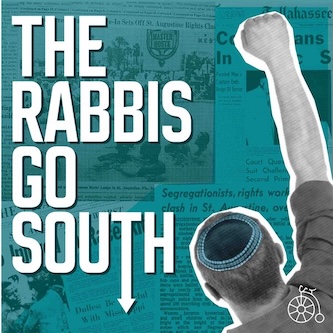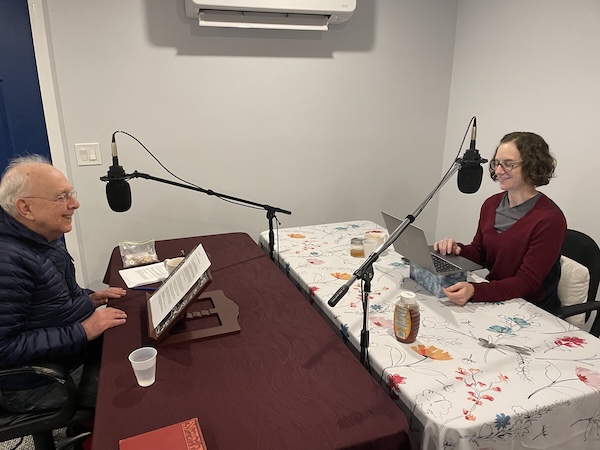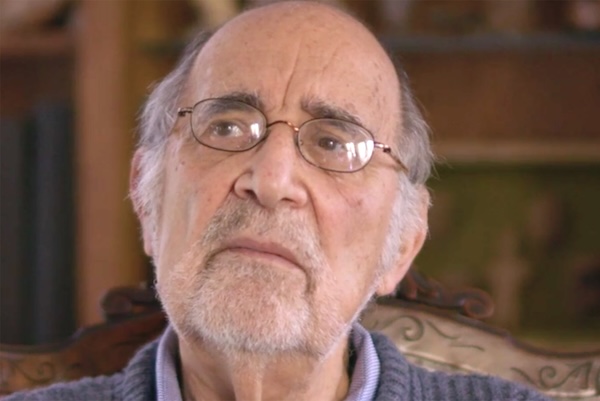Podcast Interview: Amy Geller and Gerald Peary on Making “The Rabbis Go South”
By Bill Marx
The Rabbis Go South tells the story of a little-known episode in the fight for desegregation: 16 rabbis were invited by Martin Luther King to be part of the 1964 civil rights march in St. Augustine, Florida.
 Hard to think of a better time to listen to a podcast about 16 Reform rabbis who, in the summer of 1964, got into ‘good trouble’ when they teamed up to protest for civil rights with Martin Luther King Jr. and the Southern Christian Leadership Conference. The Rabbis Go South tells the story of this little-known episode in the fight for desegregation: the rabbis were invited by MLK to be part of a night march in St. Augustine, Florida, and then a day protest. During that latter action — in a very segregated, aggressively policed city — the religious leaders and Black activists were arrested. Their incarceration made national news, including the NYTimes, a dramatic second act to MLK’s arrest at St. Augustine’s Monson Motor Lodge earlier that month. An underlying political impulse behind the agitation in Florida: the Civil Rights Act of 1964 was stalled in Congress at the time. Something dramatic was needed to move the bill along … and the publicity around what happened at St. Augustine, including the rabbis’ jailing, might have supplied the right nudge.
Hard to think of a better time to listen to a podcast about 16 Reform rabbis who, in the summer of 1964, got into ‘good trouble’ when they teamed up to protest for civil rights with Martin Luther King Jr. and the Southern Christian Leadership Conference. The Rabbis Go South tells the story of this little-known episode in the fight for desegregation: the rabbis were invited by MLK to be part of a night march in St. Augustine, Florida, and then a day protest. During that latter action — in a very segregated, aggressively policed city — the religious leaders and Black activists were arrested. Their incarceration made national news, including the NYTimes, a dramatic second act to MLK’s arrest at St. Augustine’s Monson Motor Lodge earlier that month. An underlying political impulse behind the agitation in Florida: the Civil Rights Act of 1964 was stalled in Congress at the time. Something dramatic was needed to move the bill along … and the publicity around what happened at St. Augustine, including the rabbis’ jailing, might have supplied the right nudge.
The seven-part podcast was produced, written, and hosted by Boston University Assistant Professor (Film & Television) Amy Geller and her husband, Gerald Peary, award-winning filmmakers who co-directed The Rabbi Goes West (2019). (Peary also critiques film and books for The Arts Fuse.) While making that documentary, they met Allen Secher, a Reform rabbi who introduced them to this fascinating episode in civil rights history. Initially, they wanted to make a documentary, but eventually the pair discovered that the most effective way to tell the story was in a podcast. The Rabbis Go South is presented by the Hub & Spoke Expo and available wherever you get your podcasts. If you’re unfamiliar with how to tune in to podcasts, simply listen on YouTube: https://www.youtube.com/playlist?list=PLP8C5YxKHaSTSOYGD1_g5h8B4tGCdiTvd
I talked to Geller and Peary about how they didn’t want to supply yet another “white savior” narrative, the public response to The Rabbis Go South, and the role the pair think St. Augustine might have played in helping to pass the Civil Rights Act of 1964.
Arts Fuse: What was your political motivation for making the podcast?
Gerald Peary: Amy and I are both secular Jews and we are both drawn to Judaism’s impulse to change the world, to improve the world you live in while you live in it before you go off to heaven or hell or wherever else. We believe ours is a very good story about Jews being there to help, not in a ‘white savior’ way but to be, in our choice of words, “foot soldiers” in the Civil Rights Movement, marching behind MLK and the Southern Christian Leadership Conference. The rabbis were brought South to assist, in a very small way, desegregate the city of St. Augustine, Florida. So our interest was not just in the participation of Jews, but in the fact that Jews and Blacks were working together in a very positive and fruitful way.
Also, we were interested in presenting forgotten history, talking to the participants, some now in their mid-80s, while they can still tell their stories. So when Rabbi Allen Secher came to Amy and me and said ‘I would like you to tell my story before I die,’ what happened sixty years ago, my ears perked up. That is exactly the kind of invitation that interests me.
Amy Geller: Our culture tends to highlight ‘white savior’ stories that undermine Black leadership. One of the things we emphasize making The Rabbis Go South is that, in the movement in St. Augustine, MLK and the Southern Christian Conference leadership were really guiding the civil rights strategy. Although 16 Reform rabbis are our protagonists, we are careful to present the rabbis as willing “foot soldiers” in a movement that was guided, led, and strategized by African-Americans, from the grassroots all the way up. One of the takeaways for our audience is to consider this question: how can established Jews, and others with privilege and power, support a civil rights movement without taking it over? Not being leaders but content to put themselves — their bodies and minds — on the line to support that movement. Also, you see a lot of right-wing leaders and others wanting power today trying to undercut solidarity by setting different groups against each other. Pitting Jews against Blacks, women against men, and so on. This story shows that if we work together for a good cause, we are stronger for it. It’s a cliche, but it is very much the case.

Gerald Peary and Amy Geller working on the podcast. Photo: Gary Waleik
AF: You maintain an intriguing balance in the podcast between treating the rabbis as somewhat heroic and also as ‘foot soldiers’.
Peary: What is good about the rabbis who came to St. Augustine and were arrested is that they didn’t see themselves in any way as big deals. They were doing what rabbis should do. It’s as simple as that. They insist that the real heroes there were the city’s Black people who, by taking part in any civil rights protest at all, were really putting their lives on the line. They were certainly putting their jobs on the line. The rabbis could come in to St. Augustine and be arrested and go back home to being rabbis and be celebrated. The local African-Americans had to face the white establishment of St. Augustine who punished them for their civil rights activities.
Yes, as we kind of discredit the deeds of the rabbis, we bounce back in our podcast and credit them! They are not heroes, but they did go to jail in the scary South. We also note that, while they were in prison, they wrote this unbelievable document called “Why We Went,” which explains their reasoning for being in St. Augustine. It is a beautiful, beautiful text, and our claim is that it might be, after MLK’s “Letter from a Birmingham Jail”, the second best manifesto to come out of the Civil Rights Movement. People should go here and read it, it is pretty extraordinary.
Also we suggest, though we don’t come to a conclusion, that the rabbis’ arrest might have been a major reason that, back in Washington, the Civil Rights Act passed. Stories on the jailing of the rabbis made the front pages of the NYTimes and the Washington Post in the days before the Senate was voting to ratify the bill. That might have helped to switch opinions. So maybe the rabbis did something important when they were in St. Augustine, even as we assert it was the Black people first. Let’s give credit to the rabbis — while we also don’t give them credit.
Geller: As they don’t see themselves as heroes, we are taking our cues from them. Here’s a funny side story to our podcast walking the line in its depiction of the significance of the rabbis. We used AI to craft the synopses of some of the episodes. We would do the first draft and then run that draft through AI and, with curiosity, see what the robots would come up with, before we provided a second draft. What AI, in this case Gemini, tends to do is to make everything more dramatic. So it really centered on the ‘white savior’ story when it rewrote our synopses. It would change the conflict so that the heroes were always the rabbis! We had to keep rewriting the material, chastising Gemini, telling it that this is NOT a ‘white savior’ story. “Please go back to the rabbis as foot soldiers,” that kind of thing. We know that bias is built into these AI systems; here was a very concrete example of how that bias works.
AF: The podcast is circumspect about just what was accomplished by the rabbis, the march, and the arrests.
Peary: Yes, and what happened in St. Augustine, past and present, is a metaphor for civil rights in America. All the hope of the ‘60s ended up with what we have today. Locally, it’s Black people who only have $70 in the bank – this situation in liberal, liberal Boston. We see that in the podcast. There is optimism and pessimism: after you see the best sides of human beings the results in the real world are, unfortunately, quite small.

Rabbi Allen Secher. Photo courtesy of The Rabbis Go South podcast
AF: Some of the Black residents of St. Augustine would agree.
Geller: You have civil rights activists on the ground who lived through this movement and fought on the front lines, like James Jackson, insisting ‘things really haven’t changed. Yes, we’ve had a Black president but that hasn’t swung the pendulum that far’. But then you have people like Gayle Phillips, who is younger and runs the African-American Lincolnville Museum and Cultural Center, observing ‘but now I can go into any restaurant or store and not be discriminated against, at least overtly’. So there have been small changes — but there is so much further to go.
AF: What has listener response to the podcast series been like so far? Gratifying?
Peary: Our best experience with the podcast is on a personal level. People have called us, saying that they’d been listening to every episode and can’t wait for the next episode to drop. We have had a few of those messages, but they are so rare. When Amy and I made a documentary we would go out in the world and screen the film for people. Audiences were given an opportunity to take part in a Q & A, and that is really, really lovely. But podcasts offer little of that. When we learned that 3000 people listened to the first episode of The Rabbis Go South we were delighted, but we were left wondering – who are these people? We don’t know them, none of them have talked to us. You don’t get the same experience you get with a live audience – it doesn’t happen with podcasts. And that is sad.
Geller: Gerry is conditioned to have the filmmaker’s high, an interaction with the audience after the film is screened. The high is different for podcasts. We have done a couple of events where we have spoken on panels and talked about our process and the research that we did, what we learned by making this podcast. That said, we haven’t figured out the social impact piece, how to create conversation and discussion. One really amazing thing did happen: out of the blue we heard from the granddaughter of one of the rabbis who was one of the 16. She had been hearing this story for years from her family but she had never really understood the impact that her grandfather had made. Somehow her father came across our podcast and she wrote us a love letter, saying how emotional it was for her to hear this story, how grateful she was that we told it. Here’s an example of the podcast’s social impact. We would like more of such experiences
Bill Marx is the editor-in-chief of The Arts Fuse. For four decades, he has written about arts and culture for print, broadcast, and online. He has regularly reviewed theater for National Public Radio Station WBUR and The Boston Globe. He created and edited WBUR Online Arts, a cultural webzine that in 2004 won an Online Journalism Award for Specialty Journalism. In 2007 he created the Arts Fuse, an online magazine dedicated to covering arts and culture in Boston and throughout New England.
Tagged: "The Rabbis Go South", Amy Geller, Gerald Peary, Martin Luther King Jr., civil rights
